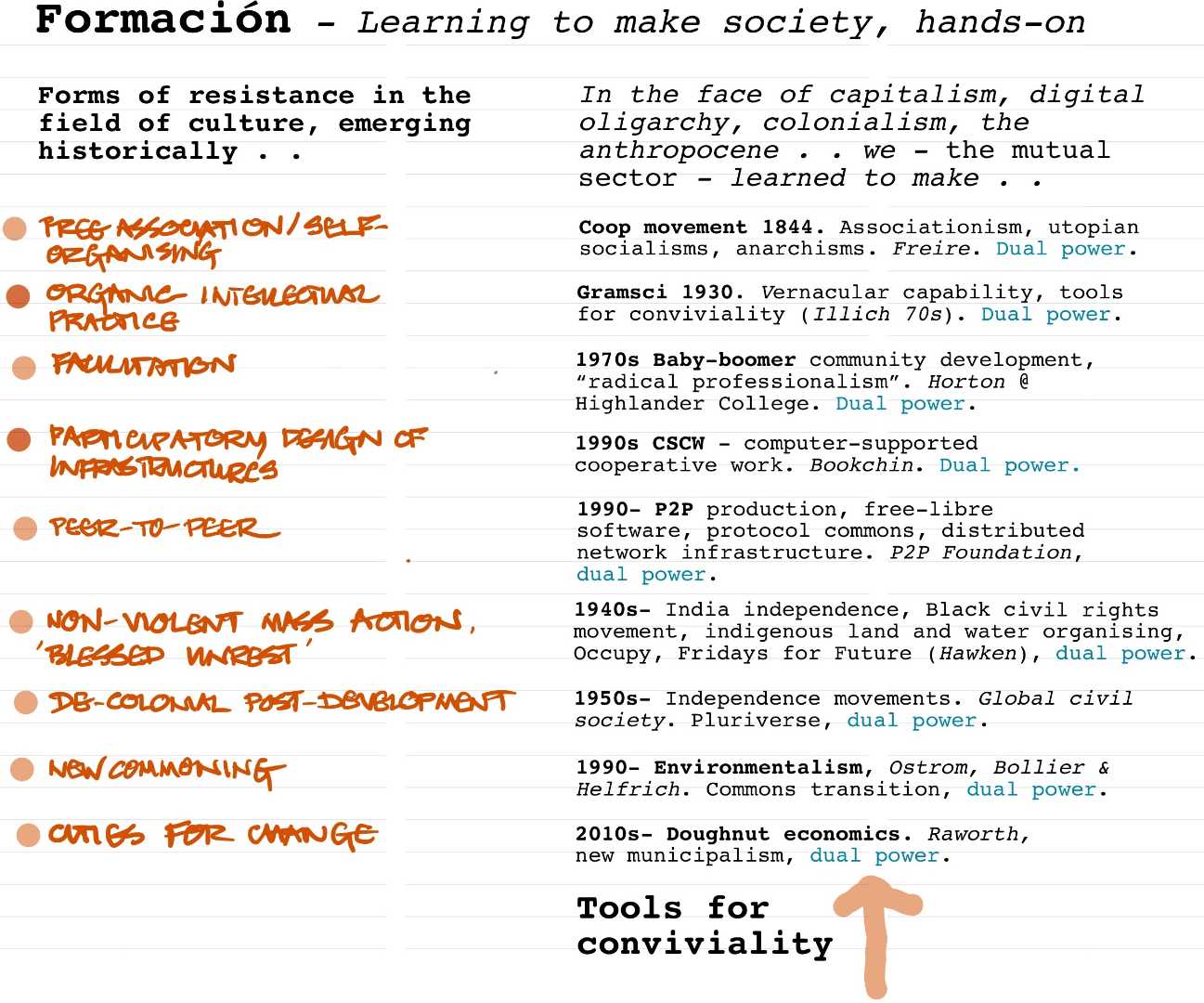Tools for conviviality is a framework for thinking about and mobilising ways of knowing and organising. Here we develop a perspective on altered relations of cultural production - practices of knowing and capability - in terms of tools for conviviality. We describe the dance of knowing that is part of making a living economy, and the concerns of design justice, stewarding, structures of feeling, and other dynamics of power that are wrapped up in conviviality and its institutions.
# Context
Tools for conviviality is a framework for thinking about and mobilising ways of knowing and organising, and thus it sits within Zone ¿3 of the foprop weave: Knowing and being capable in the collective - Formación work.
Just as in the real economy itself, ways of knowing and organising need to be held under altered relations of production. Historically, from the time of capitalism's emergence to the present, and in response to challenges of Fordism and post (and post-post) Fordism, environmental crisis and colonial oppression, formations of activists have evolved ways of knowing and organising in resistance and re-making. 'Tools for conviviality' is a frame for assembling a whole range of such evolved responses (and seeking to identify the defining patterns within them), so they may be more self-consciously mobilised and hybridised today and tomorrow, in areas of fresh challenge and need.

Tools for conviviality - An initial listing
The term 'tools for conviviality' was established by Ivan Illich in the 70s: more on this below.
Within the foprop weave, 'tools for conviviality' also sits within the cultural landscape of practice, rather than the material or aesthteic landscape. Of course material means are part of the practice of knowing (books or digital devices, obviously, for example), and aesthetic forces are powerful in shaping and orienting practice (for example, in relation to the natural world, or in relation to 'systems' seen as objects, or people seen as subjects). We'll come to aspects like these elsewhere. But the core of 'tools for conviviality' is a focus on: > capabilities to intentionally and capably know, vision, communicate, organise, collaborate, plan, review, make provision, cultivate, and sustain practices of all kinds.
# The dance of knowing
Here we map various dimensions of practice that constitute knowing and capability in the collective, in terms of a generative dance of knowing. Literacy, rigour and fluency in this dance are fundamental in formación: evolving, supporting and sustaining the activist formations that make a living economy.
Cook & Brown, elaborated.
Dance of knowing Dances in foprop - choreographing and dancing a living economy.
# Altered relations of production in culture
Altered relations of production in culture Learning to make society - Hands-on Conviviality & design justice Design, power
The central purpose of foprop as a pattern language is to highlight altered relations of production in the practice of making a living economy. In this section we look at altered relations of production in the cultural landscape, in terms of tools for conviviality.
Here we outline a series of emergent relations of cultural production, over a couple of hundred years. Making a living economy needs to discover how to systematically mobilise all of these, in a radically altered mode of cultural production: a practice of radical knowing.
Tools for conviviality are tools for design of practices and institutions, and mobilising them is done within a frame of design justice. We address this here.
# Beyond fragments, over the horizon - Stewarding conviviality Stewarding conviviality
Making a living economy centrally involves organising beyond the fragments (of our movements and regions) and over the horizon (in regional space and in time). Here we approach these challenges with regard to tools for conviviality, and specifically, the practice of college(ing).
# Structures of feeling in conviviality Structures of feeling in conviviality
Tools for conviviality are in the cultural landscape but it's plain that structures of feeling (in the aesthetic landscape) contribute a whole lot. Thus here we engage aspects of care work - radical relations of production of 'in-here' - in cultivating and mobilising commons of knowing.